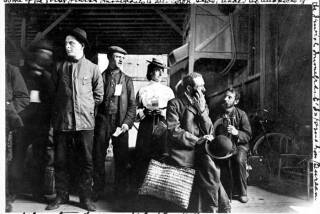Happy Landing : Refuseniks Arrive in S.D. After 12-Year Battle to Leave Moscow
- Share via
Dozens of black-and-white photos were strewn about the dining room table. The Rubinov family, Soviet Jews who emigrated to the United States nine years ago, and the Remenuks, new arrivals from Moscow, had started catching up on the nine years they were apart.
In the ranch-style home of the Rubinov family in Mira Mesa, the Remenuks and their friends spent their first day in America on Thursday reminiscing about their years together in Russia. The Remenuks’ daughter, Helen, 7, watched television in the living room.
“Freedom is first,” proclaimed Isaac Remenuk, an economist. “Freedom in speaking. Freedom in thinking. I’m tired of being afraid to speak up.”
Exhausted and somewhat overwhelmed by a handful of reporters and photographers who met them at Lindbergh Field Wednesday night, the Remenuks deplaned from an American Airlines flight after a 20-hour trip from Vienna to San Diego via Rome and New York. The move was handled by the Hebrew Immigrant Aid Society.
Happy on Birthday
“I’m happy because today is my birthday, March 16,” said Isaac Remenuk, who turned 41. “It’s a symbol for our family. I was born twice: once in 1947 and (once) this day.”
With him were his daughter, Helen; his wife Dina, 31, and his in-laws, Elia Mazgulis, 73, and Mazia Tslinezinova, 65.
The family had applied for exit visas at least 10 times in the last 12 years and had been turned down each time, Remenuk said in an interview Thursday. Their life as refuseniks--Soviet Jews denied exit visas--ended Feb. 7, when Soviet authorities informed them that exit visas had been granted and they had two weeks to leave.
“We were shaking,” Dina, a chemical engineer, said through an interpreter. “I lost my voice. I couldn’t talk for a second.”
Isaac said the family was never given a reason for the denials or for the approval.
Dina Remenuk and Neliya Rubinov were students at the Kiev University of Technology in the early 1970s when the two became close friends. Neliya dropped out of school in 1976 to marry Roman Rubinov, who now runs an auto body repair shop in Mira Mesa. They applied for exit visas in 1978 and were allowed to emigrate two years later. “We were lucky,” she said.
After settling in San Diego, Neliya wrote hundred of letters to her friend in Moscow. Numerous photos of the Rubinovs and their two boys, ages 5 and 12, never got to Dina, Neliya said. Monthly phone bills, stacked with calls to Moscow, sometimes reached $180, she said.
“Sometimes we would get so down because it looked like they would never get out,” she said. “It was very hard for us.”
‘I Have to Touch Her’
Now, Neliya said, “I cannot believe it’s true. I have to touch her to make sure.”
In the United States, the Remenuks will be aided in finding jobs by the Jewish Family Service of San Diego, which helped in the resettlement of 47 Soviet and Iranian Jews last year and 15 so far this year, spokeswoman Mildred Small said. The Remenuks will move into a Mira Mesa townhouse today and will receive financial assistance from the JFS until they can find work.
Isaac said he has had rougher times. He recalled spending an entire year without work, with the only income being the 120 rubles (about $178) a month made by his wife.
According to Leslye Winkelman, director of the Jewish Community Relations Council, more than 8,000 Soviet Jews were allowed to emigrate last year compared with 914 in 1986. She said close to 400,000 Soviet Jews currently await word on applications for exit visas. There are about 300 Soviet Jewish families in the San Diego area, Winkelman said.
“I was dreaming about this day for more than 20 years, maybe since I was a child,” said Isaac, who grew up a fan of jazz greats Sonny Rollins and Charlie “Bird” Parker.
“My dreams have now become reality,” he added, “and I am grateful.”
More to Read
Sign up for Essential California
The most important California stories and recommendations in your inbox every morning.
You may occasionally receive promotional content from the Los Angeles Times.













